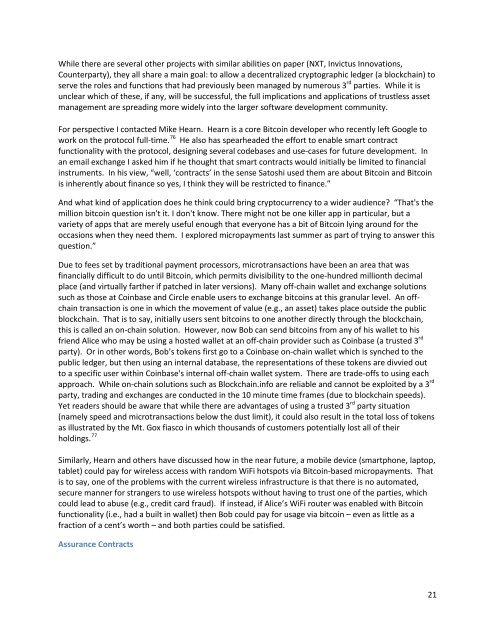Great+Chain+of+Numbers+A+Guide+to+Smart+Contracts,+Smart+Property+and+Trustless+Asset+Management+-+Tim+Swanson
Great+Chain+of+Numbers+A+Guide+to+Smart+Contracts,+Smart+Property+and+Trustless+Asset+Management+-+Tim+Swanson
Great+Chain+of+Numbers+A+Guide+to+Smart+Contracts,+Smart+Property+and+Trustless+Asset+Management+-+Tim+Swanson
You also want an ePaper? Increase the reach of your titles
YUMPU automatically turns print PDFs into web optimized ePapers that Google loves.
While there are several other projects with similar abilities on paper (NXT, Invictus Innovations,<br />
Counterparty), they all share a main goal: to allow a decentralized cryptographic ledger (a blockchain) to<br />
serve the roles and functions that had previously been managed by numerous 3 rd parties. While it is<br />
unclear which of these, if any, will be successful, the full implications and applications of trustless asset<br />
management are spreading more widely into the larger software development community.<br />
For perspective I contacted Mike Hearn. Hearn is a core Bitcoin developer who recently left Google to<br />
work on the protocol full-time. 76 He also has spearheaded the effort to enable smart contract<br />
functionality with the protocol, designing several codebases and use-cases for future development. In<br />
an email exchange I asked him if he thought that smart contracts would initially be limited to financial<br />
instruments. In his view, “well, ‘contracts’ in the sense Satoshi used them are about Bitcoin and Bitcoin<br />
is inherently about finance so yes, I think they will be restricted to finance.”<br />
And what kind of application does he think could bring cryptocurrency to a wider audience? “That's the<br />
million bitcoin question isn't it. I don't know. There might not be one killer app in particular, but a<br />
variety of apps that are merely useful enough that everyone has a bit of Bitcoin lying around for the<br />
occasions when they need them. I explored micropayments last summer as part of trying to answer this<br />
question.”<br />
Due to fees set by traditional payment processors, microtransactions have been an area that was<br />
financially difficult to do until Bitcoin, which permits divisibility to the one-hundred millionth decimal<br />
place (and virtually farther if patched in later versions). Many off-chain wallet and exchange solutions<br />
such as those at Coinbase and Circle enable users to exchange bitcoins at this granular level. An offchain<br />
transaction is one in which the movement of value (e.g., an asset) takes place outside the public<br />
blockchain. That is to say, initially users sent bitcoins to one another directly through the blockchain,<br />
this is called an on-chain solution. However, now Bob can send bitcoins from any of his wallet to his<br />
friend Alice who may be using a hosted wallet at an off-chain provider such as Coinbase (a trusted 3 rd<br />
party). Or in other words, Bob’s tokens first go to a Coinbase on-chain wallet which is synched to the<br />
public ledger, but then using an internal database, the representations of these tokens are divvied out<br />
to a specific user within Coinbase's internal off-chain wallet system. There are trade-offs to using each<br />
approach. While on-chain solutions such as Blockchain.info are reliable and cannot be exploited by a 3 rd<br />
party, trading and exchanges are conducted in the 10 minute time frames (due to blockchain speeds).<br />
Yet readers should be aware that while there are advantages of using a trusted 3 rd party situation<br />
(namely speed and microtransactions below the dust limit), it could also result in the total loss of tokens<br />
as illustrated by the Mt. Gox fiasco in which thousands of customers potentially lost all of their<br />
holdings. 77<br />
Similarly, Hearn and others have discussed how in the near future, a mobile device (smartphone, laptop,<br />
tablet) could pay for wireless access with random WiFi hotspots via Bitcoin-based micropayments. That<br />
is to say, one of the problems with the current wireless infrastructure is that there is no automated,<br />
secure manner for strangers to use wireless hotspots without having to trust one of the parties, which<br />
could lead to abuse (e.g., credit card fraud). If instead, if Alice’s WiFi router was enabled with Bitcoin<br />
functionality (i.e., had a built in wallet) then Bob could pay for usage via bitcoin – even as little as a<br />
fraction of a cent’s worth – and both parties could be satisfied.<br />
Assurance Contracts<br />
21


